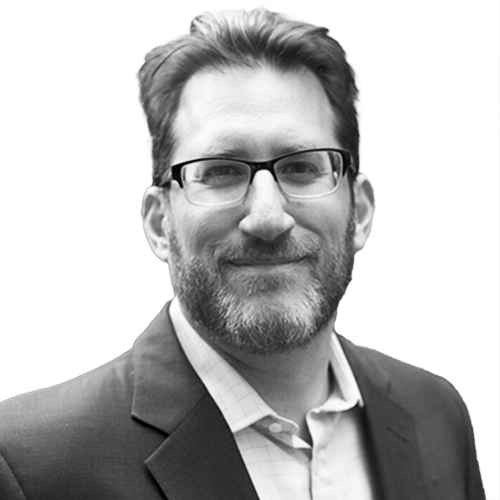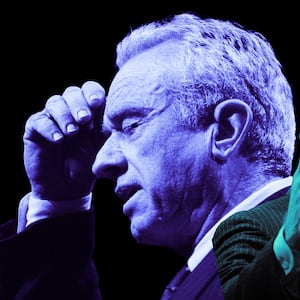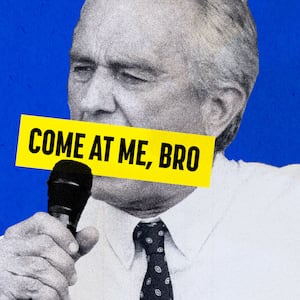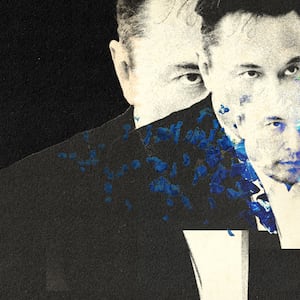When it comes to debating conspiracy theorists, there is a simple but enduring rule—don’t.
The entire exercise is pointless because no matter how many facts you bring to the table—or no matter how much debunking you’re able to do—there are always new tangents and new questions raised. Arguing with a conspiracy theorist is like trying to untangle a ball of yarn that has no end.
That brings us to Democratic presidential candidate and conspiracy theorist devotee Robert F. Kennedy Jr.
In recent weeks, RFK Jr., who, according to recent polls, is attracting between 10-20 percent of Democratic voters, has become a focus of political media. There have been splashy profiles in the Washington Post and Time magazine; political analysis about his surprising poll numbers from The New York Times; and countless interviews with non-traditional news outlets, including a three-hour sit-down with Joe Rogan, the country’s most listened-to podcaster.
A growing number of billionaire tech bros, like Twitter owner Elon Musk, are praising Kennedy’s run. And according to a recent report from Brandy Zadrozny at NBC News, so many reporters are now covering Kennedy’s campaign there was not room for her to accompany the candidate to official events.
But, in reality, we should be paying less, not more attention, to Kennedy Jr. He has no chance of winning the Democratic nomination and he is not so much running for president as he is seeking a platform for his bevy of conspiracy theories that, in the most charitable telling, are misguided ramblings and, from a darker perspective, risk undermining public health and putting lives in danger.
The mainstream media is not required to give Kennedy Jr. a platform or cover his campaign, and they shouldn’t. The benefits of covering his quixotic bid for the White House are more than offset by the damage he can do by pushing his deranged conspiracy theories on an unsuspecting public.
What separates Kennedy Jr. from your garden-variety, conspiracy theorist dabblers is that he doesn’t just believe one of them—he appears to embrace them all.
He has publicly intimated that the CIA conspired to kill his father, Robert F. Kennedy, and uncle, President John F. Kennedy. He says that 5G wireless technology is a plot by the government “to harvest our data and control our behavior” and that wifi radiation causes brain tumors. He has suggested that chemicals in the nation’s water supply are causing children to become transgender, and claims "the Chinese are developing ethnic bioweapons ... that are designed to attack people of certain racial types."

Democratic presidential candidate Robert F. Kennedy Jr. delivers a foreign policy speech at St. Anselm College in Manchester, New Hampshire, on June 20, 2023.
Brian Snyder/ReutersHe also says that the CIA exerts control over the editorial decision-making of some of the top liberal media outlets, including The New York Times and the Washington Post—and he continues to adhere to a long-discredited notion that John Kerry actually won the 2004 presidential election.
None of these claims are true—or at the very least, they are not proven.
But Kennedy’s most dangerous proclamations have to do with public health. In 2006, he wrote a long article co-published by Salon and Rolling Stone (both sites have since retracted them) that claimed the preservative thimerosal, which had previously been used in vaccines, was responsible for an increase in autism cases. The government, said Kennedy, “knowingly allowed the pharmaceutical industry to poison an entire generation of American children.”
Though this theory has repeatedly been debunked, Kennedy continues to claim he is correct, and he questions the notion that childhood vaccines are actually effective at protecting kids from infectious diseases.
More recently, he has jumped on the anti-COVID vaccine bandwagon. He says, for example, that “COVID was clearly a bioweapons problem.” Like Donald Trump, he promoted ivermectin as a treatment for the virus (it’s not). In 2021, he published a book titled, The Real Anthony Fauci, that accused the doctor and others of “a historic coup d'état against Western democracy" by exaggerating and prolonging the COVID pandemic and misleading Americans about the effectiveness of vaccines.
The book sold more than a million copies and turned him into a darling of right-wing conspiracy theory enthusiasts. Indeed, Kennedy has said the reaction to the book—and the growing attention to his views—pushed him to seriously consider a run for president.

Tablets of Ivermectin medication.
Soumyabrata Roy/NurPhoto via Getty ImagesThat last sentence is undoubtedly the only time someone should use the word “serious” in reference to Kennedy’s presidential run.
While his presidential website states that “Robert F. Kennedy, Jr. has clear positions on most of today’s divisive trigger issues like abortion, guns, and immigration,” those “clear positions” are nowhere to be found.
Here is how Kennedy’s website proposes to deal with these complex and highly contentious issues:
“Everyone wants their children to be safe. Few relish the thought of dead fetuses, nor do they want to force women to have unwanted babies. Everyone wants safe streets, yet few wish for millions of people to languish in prison. Robert F. Kennedy will draw on the broad moral agreements beneath our divisions. He will model careful listening, and create conditions where each group can hear the stories of the other. He will lead the way toward national reconciliation, respectful dialog, and willingness to change, to grow, and to forgive.”
These are platitudes piled on top of bromides that have the substantive content of cotton candy.
To the extent Kennedy has stated policy positions in media interviews, they are wildly out of touch with the party he wants to lead. For example, on guns, Kennedy says, “he would not take away people’s guns as a solution to reducing mass shootings,” and he claims anti-depressants are responsible for causing a wave of school shootings (they haven’t). On immigration, he’s said he “will make the border impervious” and has said he is more with Donald Trump than Joe Biden on the issue. On the Ukraine war, he blames the country’s president Volodymyr Zelensky and “American NeoCons” for provoking the conflict.
If not for the fact that his last name is Kennedy, it’s doubtful anyone would be paying attention to him—and it’s likely that Kennedy’s poll numbers are inflated by the fact that he is Robert F. Kennedy’s namesake.
The mainstream media is under no obligation to closely cover his campaign.
As Jay Rosen, a professor of journalism at New York University and a press critic, said to me, “Networks don’t really sit down and discuss the status of certain candidates. They make implicit decisions on who to cover and who not to—but they don’t have a clear policy.” Indeed, says Rosen, “If you asked a newsroom like their policy” on covering presidential candidate, “they are not going to fetch it for you because it doesn’t exist.”
Journalists make these coverage decisions all the time. It’s why the public utterances of Florida Gov. Ron DeSantis are routinely news, while former Arkansas Gov. Asa Hutchison or North Dakota Gov. Doug Burgum could walk into the newsroom of a major media organization and may or may not get noticed. Certainly, journalists are not fighting for room on the campaign bus to report on Marianne Williamson, who is also challenging Joe Biden for the 2024 Democratic presidential nomination.
While journalists can run into trouble when deciding which candidates to closely cover and which ones to ignore, with Kennedy Jr., the decision can be justified far more easily—he is spreading dangerous misinformation about public health that puts lives at risk. This is not conjecture. Over the past three years, hundreds of thousands of Americans needlessly died from COVID because they were not vaccinated. Many refused vaccination because they believed the type of conspiracy theories that Kennedy has spent much of the two decades peddling.

Jean Tobin wears a hat reading "Make Vaccine Manufacturers Liable Again" before a speech by Robert F. Kennedy Jr. announcing his candidacy for the Democratic presidential nomination, in Boston, Massachusetts, on April 19, 2023.
Brian Snyder/ReutersGiving him a larger platform to spout his conspiracy theories and portraying him as a serious candidate could literally have deadly consequences. Because of Kennedy’s willingness to spread misinformation and his conspiracy theorist’s facility for constantly moving goalposts and raising new questions, no reporter or interviewer can effectively fact-check him in real-time.
Some journalists will reassure themselves with the old saw that “sunshine is the best disinfectant,” and that exposing Kennedy’s falsehoods will stop people from believing them. But as Whitney Phillips, a journalism professor at the University of Oregon, pungently noted several years ago, “While that light might disinfect for some, for others, it can promote dangerous ideologies and cultivate ever-worsening threats to public health.” The rise of Donald Trump and the cult-like hold that he has over the Republican Party is all the proof you need that she is on to something.
Kennedy is not like Trump, another regular purveyor of conspiracy theories and easily disproved lies. Some news organizations tried to ignore Trump when he first ran for president in 2015 (the Huffington Post infamously declared that it would only cover his presidential bid in the outlet’s entertainment section). But it soon became clear that the reality show star had a genuine following within the Republican Party. Today, Trump is a former president, a legitimate candidate, and the frontrunner for the 2024 Republican nomination. The press must cover him, for better or worse (mostly worse). But Kennedy doesn’t check any of these boxes, and, to boot, he’s a genuine public health menace.
While one obvious solution would be to report on Kennedy’s campaign but, at the same time, correct his lies, merely giving him media attention creates a coverage feedback loop.
The more focus on Kennedy, the more other journalists feel they must report on his campaign, which leads to more coverage and, slowly but surely, gives him and his campaign a veneer of respectability. As Rosen notes, “Journalists say they don’t want to be the story, but the coverage loop builds up a candidate,” so over time, the attention they devote to a candidate makes reporters part of the story.
The easier and better solution is to treat Kennedy like the fringe, extremist, unhinged candidate that he is. Nothing good will come from giving him a platform to spread lies.











